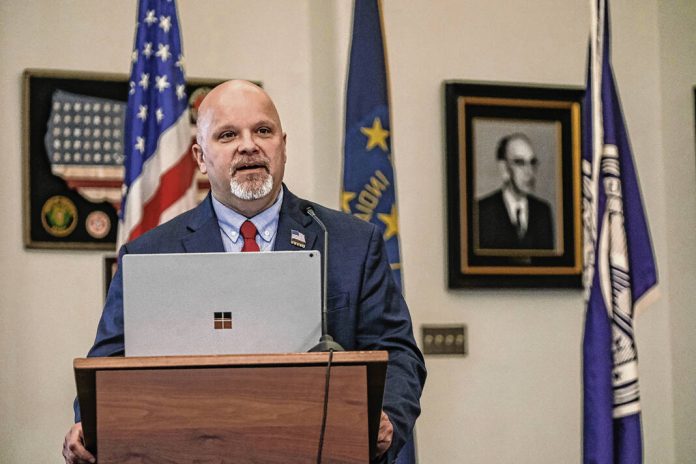
Mike Wolanin | The Republic Bartholomew Superior Court 1 Judge James Worton speaks at a graduation ceremony for veterans in the Bartholomew County Veterans Treatment Court in Bartholomew Superior Court 1 at the Bartholomew County Courthouse in Columbus, Ind., Thursday, June 8, 2023.
COLUMBUS, Ind. — Bartholomew Superior Court 1 Judge Jim Worton has announced that Bartholomew County’s newest problem solving court is up and running.
The Bartholomew County Mental Health Treatment Court (MHTC) has obtained provisional certification from the Indiana Office of Court Services and is accepting referrals.
“I am so excited to finally see this come to fruition,” Worton said. “I believe this court will provide a much needed service to one of our most vulnerable populations. It is my hope that this new problem solving court will help improve lives, restore family relationships, and provide the tools needed to keep those suffering from mental illness, who have become involved in the criminal justice system, from coming back to the justice system.”
Worton also presides over the Veterans’ Treatment Court, while Judge Kelly Benjamin presides over Drug Recovery Court and Magistrate Brittany Long presides over Family Recovery Court.
In his efforts to establish the court, Worton said earlier that too many families have no idea of what to do with a loved one with a mental illness, especially after they become involved in the criminal justice system.
“The court would provide a lot of structure and extra supervision for that individual that our standard criminal justice system doesn’t do,” he said.
Mental Health Court has the support of Bartholomew County Chief Deputy Sheriff Maj. John Martoccia, who served six-and-a-half years as jail commander.
Once the community starts to look at the individual reasons for why a person is in jail and address them, “it becomes a ‘win-win’ for the entire community, Martoccia said.
“You can’t just address them as a group,” the chief deputy said. “If you look at what each individual needs to stay out of jail, I don’t see how you can lose at that.”
Eligibility
In order to be accepted into the new court, the defendant has to first volunteer, Worton said. The next step would be undergoing tests to confirm that, despite a serious mental illness, he or she is legally competent, he said. Finally, a decision must be made that Mental Health Court would be the most appropriate way to help the individual, he said.
However, Bartholomew County Prosecutor Lindsey Holden-Kay has absolute veto power to keep a defendant out of the program, Worton said.
Mental Health Court is not for those who suffer psychiatric problems due to drug addiction, Worton said. The only way he would admit a person who has committed domestic violence into the program is if the victim requests it, he said.
The new court is intended for low-to-mid level offenders who have committed non-violent crimes or non-sexual offenses primarily due to a mental illness, Worton said. The program’s goal is to try and stop a person from making additional offenses and be placed back into jail with multiple charges, he said.
How it works
If the person is accepted into the program, the team would begin hearings with that individual every other week or potentially every week, depending on how many people are in the program, Worton said. Team members will participate in developing a judicially-supervised treatment plan specifically for each volunteer.
The defendant will be monitored multiple times a week by a case manager whose duties include making sure the participant has shelter, has household necessities, is taking their medication as prescribed and following the treatment plan, the judge said.
Worton says he has often seen defendants with a mental illness commit one minor offense, get out of jail, and commit additional offenses.
The ultimate goal of mental health court is to give participants enough resources and tools to live a fairly normal life and stay out of jail, he said.
A person accepted into the program will be making a maximum two-year commitment, according to Worton.
“Some will be longer and some shorter, depending on the circumstances,” the judge said. “We will establish that range based on different recommendations we receive from other courts before we finalize them.
In most Mental Health Courts, a participant is required to stay with the program even after their sentence has expired.
While in the program, a participant will be required to follow all rules and meet every requirement listed in different phases, Worton said. A series of incentives and sanctions are used to help modify behavior, the judge said.
If the individual does not fulfill requirements, he or she might have to start all over again or be removed from the program, he said.
Challenges
One of the most challenging aspects of a Mental Illness Court identified by Worton is finding the right medication or combination of psychotropic drugs that produce little to no side effects. Each person has a different reaction to different drugs, he said.
“For some people, the wrong medication can just set them on fire,” Worton said.
But a slightly different prescription drug might work perfectly for them, the judge said. But not indefinitely. The right drug may work for a period of time, but eventually have no beneficial effect, the judge said.
Compared to the other problem-solving courts, public recognition of successful participants may have to be toned down because mental illness is considered a medical condition and therefore subject to federal privacy laws.
In preparation, Worton and others involved with the courts have visited mental health courts in neighboring Johnson County, as well as in Porter and Monroe counties.
The group also went to Kentucky to observe an assisted outpatient treatment court that Bartholomew Superior Court II Judge Jon Rohde is considering, Worton said.




